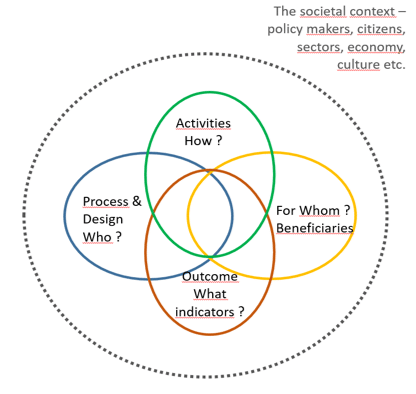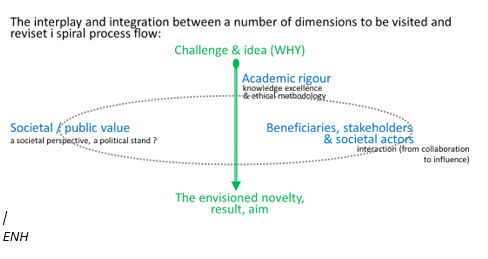What is impact?
Researchers are faced with an increasing demand to identify, describe and document the impact of their research. As research supporters we need to understand what impact is and how the potentials for impact in research projects can be enhanced.
Defining impact
Impact can be understood as research leading to an identifiable change in a societal or institutional practice/procedure/process or a technological product/method used in the real world.
This means that:
- Impact can be a physical, tangible thing, such as a new product or an institutional or discursive phenomenon, such as a procedure, a debate, a changed practice or skills development in the real world.
- Impact relates to a specific societal segment, i.e. it is possible to identify stakeholders and/or beneficiaries that use, benefit from, have an interest in or are otherwise affected by the research in question.
- The change is subject to a temporal dimension: Immediate, short term or long term, often labelled outputs, outcome and impact.
- Impact is often the result of a deliberate collaboration between sectors, e.g. between researchers and external stakeholders. However, impact can be intended as well as unintended.
Most definitions of research impact distinguish between academic impact (such as publications and citations) and societal impact (effects beyond academia). When describing impact, e.g. in research applications, it is important to be aware of this distinction.
A small collection of definitions can be found here:
ESCR UK: We define research impact as ‘the demonstrable contribution that excellent research makes to society and the economy’. This can involve academic impact, economic and societal impact or both:
- Academic impact is the demonstrable contribution that excellent social and economic research makes in shifting understanding and advancing scientific, method, theory and application across and within disciplines
- Economic and societal impact is the demonstrable contribution that excellent social and economic research makes to society and the economy, and its benefits to individuals, organisations and/or nations.
The impact of research, be it academic, economic and social can include:
- Instrumental: influencing the development of policy, practice or service provision, shaping legislation, altering behaviour
- Conceptual: contributing to the understanding of policy issues, reframing debates
- Capacity building: through technical and personal skill development.
Source: https://esrc.ukri.org/research/impact-toolkit/what-is-impact/
REF: …an effect on, change or benefit to the economy, society, culture, public policy or services, health, the environment, or quality of life beyond academia
Source: https://re.ukri.org/research/ref-impact/
Research Council UK (RCUK): The demonstrable contribution that excellent research make to academic advances, society and the economy
Source: https://www.ukri.org/innovation/excellence-with-impact/
University of York: Translating research into real-world outcomes, benefiting the health, prosperity and the well being of people and society
Source: https://www.york.ac.uk/staff/research/research-impact/impact-definition/
Impact seen from different levels
Different actors have different perspectives on what impact could or should be. When describing research impact it can be helpful to consider the following levels:
- The individual researcher. What are my aims and ambitions? What novelties to I want my research to develop?
- The research environment. What are the grand challenges in the field, and how can we contribute?
- The institution. What role do we as an institution want to play in society? Which part (sectoral, geographical) of society do we want to engage with?
- Funders. What is our profile, strategy and raison d’être?
- Societal actors/stakeholders. What’s in it for us? Which instruments of change can this research provide us with?
Describing impact
When describing the intended or potential impact of a research project, for example when writing a research application, it is useful to ask yourself the following questions:
- Who? (the researchers and their project – process and design)
- How? (activities, outputs, engagements)
- For whom? (beneficiaries, stakeholders)
- What? (the outcome, indicators of change)
ENH – Inspired by Julie Bayleys https://juliebayley.blog/

The process leading to impact
In some cases, research results may lead to impact without further effort by the researcher, but impact is often the result of ongoing engagement with societal actors.
The following resources offer inspiration on how to promote impact through stakeholder engagement, media relations, communications, events, publications, social media etc.

How can impact be evaluated?
Measuring or documenting research impact is often a challenge. Positive societal changes are often the result of various interconnected research efforts and can rarely be ascribed to a single research project. However, when planning a research project it is often required that you attempt to describe how you intent to evaluate and document the impact of your particular project.
The following resources give inspiration on evaluation methods, definition of indicators etc.
